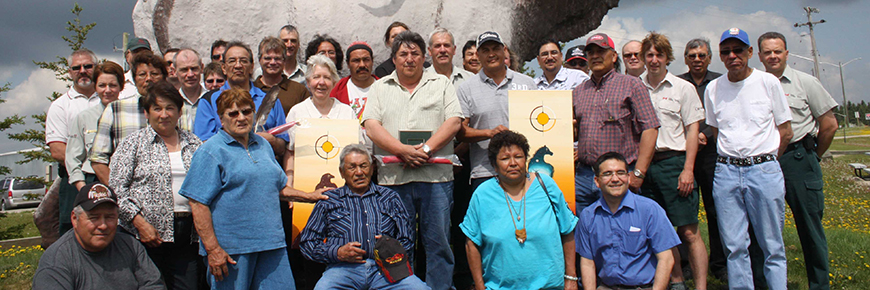
Coalition of First Nations with Interest in RMNP, group photo 2009
Coalition of First Nations with Interests in Riding Mountain National Park
Riding Mountain National Park
Riding Mountain National Park works collaboratively with Indigenous partners to protect and present the park. While the establishment of Riding Mountain National Park created opportunities and benefits for many people in the surrounding communities, it also resulted in the expulsion of the Anishinabe from their homelands. Unfortunately, this is not an isolated incident and is a practice that has changed how protected spaces are created today. This legacy is a wound that exists to this day and one that Parks Canada, on behalf of Canadians, is making efforts to build and foster collaborative relationships with the Anishinabe to heal these wounds.
During the establishment of the park, Clear Lake Indian Reserve 61A was wrongfully included in the boundaries of Riding Mountain National Park. This was protested by the Riding Mountain Band/Keeseekoowenin Ojibway First Nation before and after the park was established, but without the ability to access legal aid and no legal processes available to them, the prospect of resolving the land dispute was dire. After many decades, the Crown was in a position to deal with past wrongs towards First Nations through the specific claims process. It was through this process that the Clear Lake IR 61A lands were returned to Keeseekoowenin Ojibway First Nation Band in 1994.
After decades of poor relations and animosity, there was a need to create a space to facilitate the healing process. In 1998, Parks Canada and Keeseekoowenin Ojibway First Nation (KOFN) established the Senior Officials Forum agreement to formalize a working relationship. After the establishment of the Senior Officials Forum, it was recognized by KOFN that the conversations needed to involve other First Nations in close proximity to RMNP. In 2006, a Ministerial Agreement between Parks Canada and Indigenous partners formalized the Coalition of First Nations with Interest in RMNP (Coalition of First Nations) through the Riding Mountain Forum. Consisting of nations from Treaty 2, 4, and 1, the Coalition of First Nations includes Keeseekoowenin Ojibway First Nation, Ebb and Flow First Nation, Waywayseecappo First Nation, Rolling River First Nation, Tootinaowaziibeeng First Nation, Gambler First Nation, and Sandy Bay Ojibway First Nation. The Coalition of First Nations, while distinct and diverse, share common ancestry to the signatories of Treaty 2, who signed on behalf of the Indians of Riding Mountain and later known as the Riding Mountain Band.
These forums allow for the parties to find ways to:
- develop mutually beneficial, positive, and productive working relationships;
- identify and resolve issues of common interest or concern;
- provide advice to Parks Canada in the implementation of the Park Management Plan;
- incorporate Traditional Knowledge into management practices at RMNP;
- present First Nation history and culture at RMNP;
- offer employment opportunities in RMNP, and;
- facilitate land use within RMNP by First Nations people for traditional, spiritual and ceremonial purposes.
Related links
- Date modified :